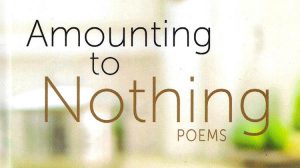The Meadow by Kristin Garth / APEP Publications / 2020
 Towards the end of Shakespeare’s sequence of 154 sonnets, the reader is introduced to a character known as the Dark Lady who plays a complicated role for Shakespeare’s speaker; she is at once the speaker’s sexually-alluring mistress and the tormentor/temptor of his soul, taking up enough space in his head to be the topic of 26 consecutive sonnets—a weird, near-terminal alphabet of haunting. These sonnets, then, form the contours of the Dark Lady’s lasting effect on Shakespeare’s speaker—the sonnet as body-memory, as scar made into song.
Towards the end of Shakespeare’s sequence of 154 sonnets, the reader is introduced to a character known as the Dark Lady who plays a complicated role for Shakespeare’s speaker; she is at once the speaker’s sexually-alluring mistress and the tormentor/temptor of his soul, taking up enough space in his head to be the topic of 26 consecutive sonnets—a weird, near-terminal alphabet of haunting. These sonnets, then, form the contours of the Dark Lady’s lasting effect on Shakespeare’s speaker—the sonnet as body-memory, as scar made into song.
Kristin Garth’s book The Meadow (APEP Publications) uses the Shakespearean sonnet form to tackle its own Dark figures from the speaker’s complicated past. (Garth is no stranger to this form, either; her book Shakespeare for Sociopaths from Hedgehog Poetry Press proves that conclusively.) A series of shadowy “doms” haunts these poems, commanding the submissive narrator in all manner of scenes that riff with ageplay, schoolgirl fetishism, and many other aspects of BDSM culture and practice. The title itself is another name for the subspace the speaker finds herself occupying in the heat of the poems’ scenes, a small panacea for when brutal, violent, sexual reality demands a kind of psychological distance—a distance Garth also enacts, quite artfully, in transmuting these myriad scenes into sonnets.
[A brief aside, as well as a content warning: Garth’s subject matter in these carefully crafted poems hearkens back to certain other representations in popular culture of the dangerously submissive siren, like Laura Palmer from David Lynch and Mark Frost’s Twin Peaks. Fittingly, Garth is also co-editor (along with Justin Karcher of Ghost City Press/Review) of an anthology of poems based in the Twin Peaks universe; the book will be titled These Poems Are Not What They Seem, and it is due out in spring 2020, also from APEP Publications. All of that said, the poems I will quote from and discuss below from The Meadow include some graphic representations of rape and rape-adjacent sex acts (i.e. rape fantasies and sex acts that began consensually and then moved beyond consent into darker territory), and could be upsetting and triggering for some readers. I will start quoting from the poems after this point.]
As with other practitioners of the sonnet sequence, Garth makes her poems feel very much like a spiked wheel of variations on one omnipresent theme; as her speaker puts it in a poem early in the book called “Freshest Dates”, about a sexual act in the woods that the speaker begs not to be forced to do, “[the q]uestion’s not how will you sleep, [/] but how to wake to woods you’ll just repeat.” As in Twin Peaks, the woods become a metonym for a broodingly violent and sexual darkness of the whole world (not just the sexual act, however kinky), and as the reader spends more time with these poems they become intimately privy to just how many forms this sexualized violence can take, even over the course of just one speaker’s sex life.
There are dizzyingly many renditions of Garth’s principal theme in the book: these sexual acts, some of which are framed in the language of consensual BDSM (“dom”, “master”, “daddy”) and others where that framing is much murkier and ambiguous (cf. the begging in “Freshest Dates” above), take place anywhere from Twin Peaks-y woods to “A steakhouse parking lot” (“We Are Fucking Happy”) to a “Chatroom” (“Laptop Sub”) to “basement dungeons” (“This Pain Requires An Audience”), and many more. The wide variety of locales serves to blur the distinction between public and private desire in these sonnets—how can Garth’s speaker’s engagements in extreme sexual power dynamics be a purely private phenomenon when one of the poems is titled “LaGuardia”, another “San Francisco”? The public, we seem to need to understand, is only ever the thinnest hair’s breadth from the private, and that hair is already bound with others into the whip whose crack we can almost hear against Garth’s speaker’s skin.
This public/private distinction is not the only line Garth successfully blurs in the book, either. Two more come immediately to mind: the line separating (or is it joining?) pleasure and pain, as well as the distinction between and among gender roles in all these scenes. For the first distinction, we need look no further than the title poem of the collection, which closes thusly:
[…] she chooses to deny. What you don’t know
can never make you cry. A place, chartreuse
and blue remakes you, on your back, rainbow.
She makes herself a meadow, sneaks inside;
a pretty patch beside all hurt, she hides.
This section illustrates beautifully the tightness with which Garth’s sonnets are crafted, packing in both internal rhyme and end rhyme to create a dense, rich music. It also illustrates the difficult negotiation Garth’s speaker, as a sexual submissive, must undertake in order to survive these repeated encounters with physical violence; the object of “chooses” in that first line is “bruise”, which adds a layer to the colors and the rainbow in the subsequent lines: on the one hand, Garth’s speaker must ignore the pain, since otherwise it would be too much to bear; on the other, she must undergo it in order to reach sexual heights in extremis—i.e., to become the rainbow. She is never beyond the pain, never fully transcends it. Instead she is “beside” it and “hides”, though never totally successfully; it’s the trying that gives these poems their thrill.
One might worry that The Meadow is populated by flat or repetitive characters who straightforwardly fulfill their role according to the tenets of BDSM scening; Garth’s achievement, like Shakespeare’s and that of other sexualized sonneteers before her, is that eroticization becomes a form of characterization, and Garth’s characters are as complicated and multifarious as the settings in which they find themselves. My favorite aspect of this complexity in The Meadow is when Garth’s speaker troubles the line between the dominant, experienced male character and the submissive, innocent female character, which happens at a few key points in the book; in the poem “Nipple”, for example, Garth describes the end of a scene where the male dom character makes a strange request: after “all the rest” of the scene, where presumably he has caused Garth’s speaker significant physical pain, he pulls her to his chest and makes her suck on his nipple until he falls asleep. For Garth’s speaker, the man who was once the dominant daddy figure becomes something more complicated and ambiguous: this oddly tender act is “what [/] makes it okay that he hurts you — defiles, [/] then feeds. Both father, mother, he can be.” The line break after “defiles” here is also a break in character, when the daddy figure’s veneer of dominance cracks a little and leaves room for more complex gender expression.
Perhaps Garth’s greatest triumph is a gesture of complexification in the other direction: these poems show, by their very existence and also explicitly in a few of the sonnets, that sexual submissiveness cannot be equated with passivity. Garth’s speaker is obviously an artist in the music she breathes into the recounting of her experiences, but Garth goes further even than that; in a poem called “Dangerous”, her speaker stares straight into the camera and addresses a representative dom in an online chatroom, and then she equates the power she has (of knowing the dangers of engaging with strange men in BDSM scening and doing it anyway) to the power he has: the poem ends, “I’m dangerous just like you.” This key moment shows Garth’s speaker doing what Gilles Deleuze identified in the texts of Leopold von Sacher-Masoch: building masochism into something much more complex than just the receiving end of sadism, something with an apparatus of feeling and expression that is all its own.
In all, The Meadow is a focused and intense work, one that merits reading and rereading. There are moments in it of a very bleak darkness, but there are also moments of extraordinary beauty (take, for example, the heart-stopping title “Carotid Lessons for Young Butterflies”, and the poem that follows). Kristin Garth’s oeuvre is contributing something unique to contemporary poetry, and the current landscape of verse would be much worse off without it.
[Garth’s achievement does not stop at just her poetry in The Meadow and her aforementioned editing roles, though; she is also an avid and excellent performer of her own poems. Her Twitter and Instagram presences frequently include poem-videos and other readings of poems from The Meadow and her many other projects. She is also one of the co-founders of Performance Anxiety, a monthly online reading series on which she regularly features (in the interest of full disclosure, this reviewer is the other co-founder!).]




Leave a Reply